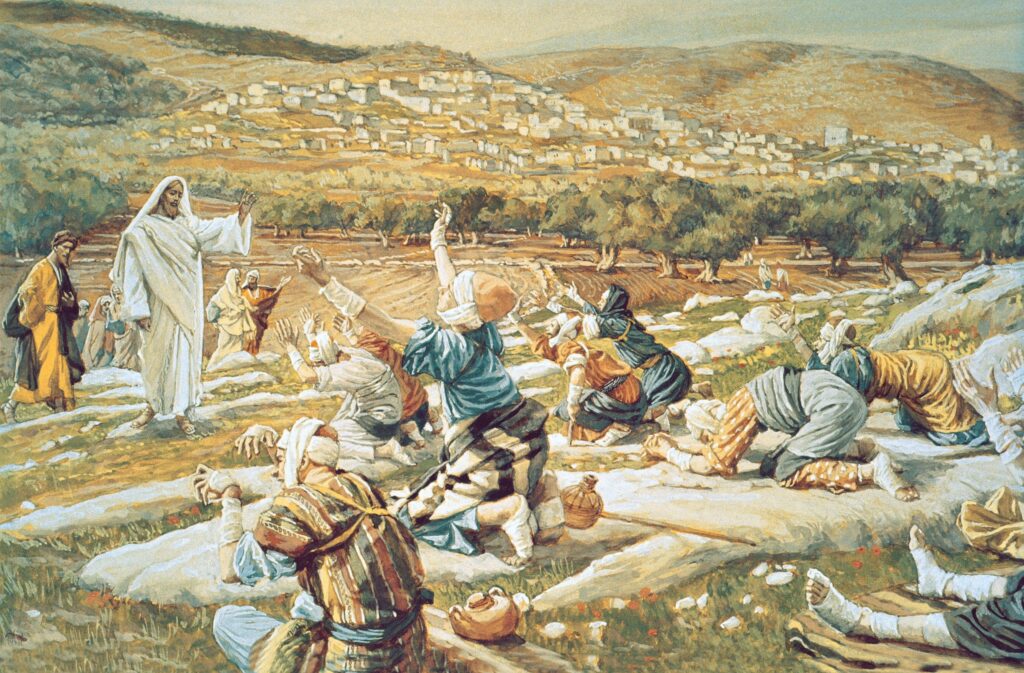Home l Liturgy & Sacraments l Liturgical Calendar
The Thirteenth Sunday after Pentecost – Sunday, August 27, 2023
Semi-double Green vestments

Continuing with the reading of the sapiential books which began on the first Sunday of August the Church orders the Book of Ecclesiastes to be commenced in the breviary lessons on the second Sunday of August.
“Vanity of vanities,” says the sacred author, “and all is vanity. There is no remembrance of former things: nor indeed of those things which hereafter are to come, shall there be any remembrance within them that be in the latter end. I have seen all things that are done under the sun: and behold all is vanity and vexation of spirit. The perverse are hard to be corrected, and the number of fools is infinite ” (1st Nocturn)
“As soon,” says St. John Chrysostom, “as Solomon was enabled to perceive the divine Wisdom, he uttered this sublime exclamation, worthy of heaven itself: ‘Vanity of vanities, and all is vanity.’ You, in your turn can bear a like witness, if you will. It is true that Solomon in past ages was not bound, to seek wisdom so diligently as we, since the Old Law did not regard the enjoyment of superfluities as vanity, though none the less, men could see that they were worthless and deserving of contempt. But we are called to more perfect virtues, scale loftier heights, and give ourselves to nobler practices. In a word, what can we say, but that we are commanded to regulate our conduct after the pattern of heavenly virtues which have nothing fleshly about them and are entirely spiritual” (2nd Nocturn).
These heavenly virtues are principally the theological ones, “faith, hope, and charity”, for which we ask God in the Collect, so that we may love what He commands (Collect). Moreover, for this reason, the Church takes for today’s Epistle a passage from St. Paul’s Epistle to the Corinthians, the subject of which is faith in Jesus Christ, a faith which works by charity, and which makes us, like Abraham of old, put our hope in this divine Redeemer. For it is by this faith, manifested in good works and trust in God, that souls, covered with the leprosy of sin, are cured, as we are reminded in today’s Gospel. The ten lepers, who in some sense stand for the transgressions of men against the ten commandments, see from afar their divine Healer, and put their trust in Him. “Master, have mercy on us.” Their faith issues in works, for when our Lord puts them to the test, telling them: “Go show yourselves to the priest,” they obey without hesitation and are cured on the way. But the cure is only confirmed in the case of one of them who returns to Jesus to express his thanks. “And one of them, when he saw that he was made clean, went back, with a loud voice glorifying God; and he fell on his face before His feet, giving thanks.” And Jesus said to him: “Arise, go thy way, for thy faith hath made thee whole.”
Hence, we learn that it is faith in Christ that saves souls. For here is St Augustine’s interpretation of this gospel in the homily for today: ” Our Lord does not say of those men who were freed from leprosy that they were cured but purified; for leprosy alters the color of the skin without, generally, taking away the integrity of the senses and members of the body.
It is not, therefore, absurd to see in the lepers, a type of those who, being without the science of the true faith, profess the changing doctrines of error. For they do not conceal their ignorance, but bring it out into the light, making it pass for superior knowledge and showing it off in boastful talk. Now there is no false doctrine which does not contain a mixture of truth. These truths and errors, mingled haphazard, in a single discussion or narrative, are like differences of color appearing in the same body, and represent leprosy which covers human bodies with spots, forming with the sound parts, diversity of color.
This sort of leper the Church is bound to exclude, so that, if possible, seeing themselves thrust far from her, they may set themselves to call, with loud cries upon Christ, like the ten men that were lepers, who stood afar off, and lifted up their voices saying: ‘Jesus, Master, have mercy on us.’
Now if our Lord worked cures in person, He leaves to the Church the task of spreading His doctrine and instructing, both by word and pen. Thus St. Paul was sent to Ananias to receive, from the duly constituted priesthood of the Church, the sacrament of faith. And later, the Apostle will go up to Jerusalem with Barnabas and Titus so that by jointly professing the doctrine of the faith before the congregation by this very reunion they might show that they had one single doctrine, excluding every kind of variation. It is about this that St Paul wisely warns the Corinthians: “I beseech you brethren, that you all speak the same thing” (Matins).
The Gospel narrative also foretells the rejection of the Jews who were ungrateful toward Him who came to cure them, while the Gentiles have been faithful. For among the ten lepers, nine were Jews and only one was not, and it was to this single Samaritan who came to thank our Lord that He said: “Thy faith hath made thee whole,” showing that it is not only to the children of Abraham by blood that this promise has been made, but also to those who are his children because they share his faith in Jesus Christ, for it is by this faith that the promise of eternal life which was made to Abraham is extended to all nations. So the prayer after the third prophecy on Holy Saturday reminds us that God “by the paschal sacrament (Baptism)” made His servant Abraham, according to His oath, ” the father of all nations”, while the fourth prayer adds: “Grant that all the nations of the world may become the children of Abraham and partake of the (lost) dignity of the people of Israel.”
The Gentiles occupy the place of the Jews. “The nine,” says St. Augustine, “swollen with pride, thought they would humiliate themselves by giving thanks, whereas by not doing so they are reproved and rejected from the unity which exists in the number ten (there were ten lepers), while the only one who thanks is praised by the only Church In the same way the Jews by their pride lost the kingdom of heaven in which dwells the greatest unity; while the Samaritan by submitting to the King, by his act of thanksgiving has preserved the unity of the kingdom by his devotion full of humility” (Matins)
The Jews will enter the kingdom of heaven all together at the end of time, believing in our Lord at last, after finding that they have been deceived in following Antichrist, a fact which is alluded to in the Introit, which contains a prayer that their exclusion from the Church may not be irrevocable: “Have regard, O Lord, to Thy covenant and forsake not to the end the souls of Thy poor: . . . O God, why hast Thou cast us off unto the end: why is Thy wrath enkindled against the sheep of Thy pasture?” And again, the Church beseeches almighty God “to look with favor upon His people, and appeased by their oblation, forgive them their sins ” (Secret).
As for the Gentiles, they say to the Lord that all their hope is fixed on Him (Offertory), for He is to become their refuge from generation to generation (Alleluia), feeding them with food from heaven as He did the Hebrews in the wilderness, and giving them the manna, which contains in itself all sweetness (Communion).
Every parish priest celebrates Mass for the people of his parish.
Copyright © 2015-2025 Saint Joseph Catholic Church, Latin Mass Parish, 602 S 34th St., Tacoma, WA 98418. All Rights Reserved.
Website comments or questions: info@saintjosephtacoma.org


